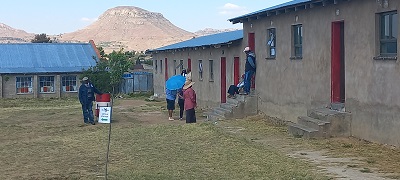By Thoboloko Ntšonyane
MASERU – The recently conducted local government elections held on September 29th were marked by a voters’ disinterest in participating.
This has again revealed a need for an increased citizen engagement and voter participation.
These had been fourth local government elections with the first held in 2005, the second in 2011 and the third in 2017.
These elections saw a voter turnout of 26.4 percent, a decrease from those of 2017 that registered 29 percent voter turnout.
During the publishing of the results after the elections were conducted and counting completed, the Independent Electoral Commission’s (IEC) Chairperson Mphasa Mokhochane said on polling day, the Commission had registered in total 1 388 053 voters, out of which 770 178 were males and females were 617 875.
There were 44 parties that participated in these elections while seven are reported to have opted out. Presently, the registered parties are 51.
There are 2 110 independent candidates who took part in these elections.
These elections also saw participation of the youth with the youngest participant being 21 years old, the IEC has reported.
The local government elections are conducted under the First Past the Post and Special Seats for women. The country is demarcated into 76 local councils and divided into 949 Electoral Divisions (EDs).
In total, there are 1 268 Council seats, made of 949 seats of EDs and 319 special seats reserved for women. In 2005, Lesotho implemented a system in which 30 percent of all the constituencies are reserved for women and in those only women can contest. The remaining 70 percent of seats are contested by both men and women wherein the winner takes all.
The ruling majority Revolution for Prosperity (RFP) got 445 council seats and it is followed closely by the main opposition Democratic Congress (DC) with 421 seats. The Independent candidates secured 105 seats.
In fourth position is Alliance of Democrats (AD) with 74 seats, and Movement for Economic Change (MEC) gained control of 57 seats, All Basotho Convention (ABC) won 73 seats and Basotho Action Party (BAP) was awarded 47 seats.
Socialist Revolutionary (SR) secured 17 seats closely followed by Lesotho Congress for Democracy (LCD) with 16 seats, Basotho National Party (BNP) won five seats, and Popular Front for Democracy (PFD) secured three seats.
Basutoland Congress Party (BCP) got two seats while Basotho Liberation Movement (BLM), Basotho Patriotic Party (BPP) and Basotho Covenant Movement (BCM) each received one seat.
In four EDs the elections were declared as failed, that is because the nominated candidates passed on before elections were held, IEC will hold the fresh elections on dates yet to be announced. And those are, Maseru Municipal Council (MCC-08), Menkhoaneng Community Council (Menkhoaneng -05), Manka Community Council (Manka-07) and Bolahla Community Council (Bolahla-03).
There is also a tie wherein candidates scored equal votes and the second round of elections will be conducted. Those are Sephokong-05, SR and DC. BCP and MEC elections resulted in deadlock at Ramoetsana -09.
DC and Independent candidate also ended up in a tie at Makoabating -04, again DC and RFP ended in a tie at Bokong – 10. In Menoaneng-15, AD and DC elections results ended in a draw.
At this point, the elected Councillors are expected to gazette before they assume duty.


